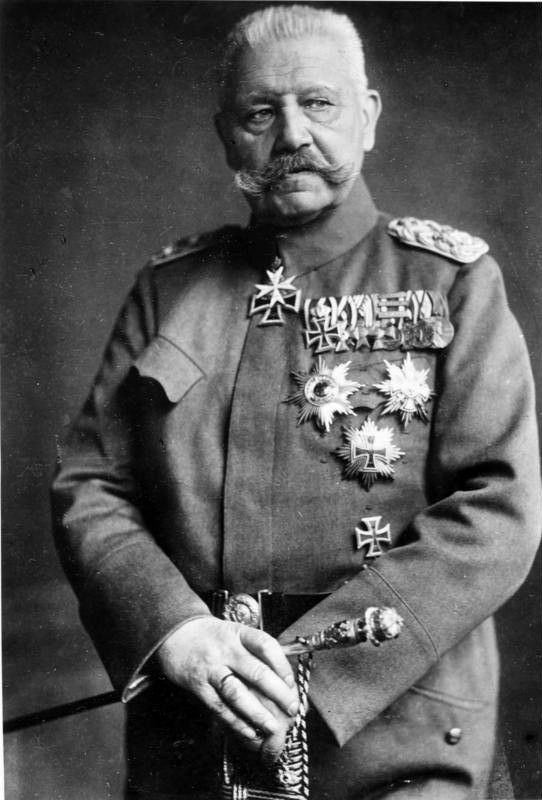Paul Ludwig Hans Anton von Beneckendorff und von Hindenburg foi um militar alemão que comandou o Exército Imperial Alemão durante a Primeira Guerra Mundial e posteriormente serviu como Presidente da República de Weimar de 1925 até sua morte.Hindenburg é geralmente lembrado como o homem que, como Presidente alemão, nomeou o líder nazista Adolf Hitler como Chanceler da Alemanha. Hitler e Hindenburg pessoalmente se detestavam, ele se referia a Hitler como um "cabo boêmio". Hitler, de forma repetida e forçada, pressionou Hindenburg para o nomear como Chanceler, mas este, continuamente, recusou o pedido.Embora com 84 anos e a saúde precária, Hindenburg foi convencido a candidatar-se a Presidente para as eleições de 1932, pois era considerado como o único candidato que podia derrotar Adolf Hitler. Hindenburg foi reeleito na segunda volta. Embora se opusesse a Hitler, a deterioração da estabilidade política da República de Weimar permitiu-lhe ter um papel importante na ascensão ao poder do Partido Nazi. Hindenburg dissolveu o parlamento, por duas vezes, em 1932, e acabou por nomear Hitler como Chanceler da Alemanha em Janeiro de 1933. Em Fevereiro, emitiu o Decreto de Fogo do Reichstag que suspendia várias liberdades civis e, em Março, assinou a Lei de Concessão de Plenos Poderes de 1933 na qual o parlamento dava à administração de Hitler poderes legislativos. Hindenburg morreu no ano seguinte, após o qual Hitler declarou que o lugar de Presidente ficava vazio e, como "Führer und Reichskanzler", ele próprio era o Chefe de Estado.
O famoso zeppelin Hindenburg que foi destruído pelo fogo em 1937, recebeu o nome em sua homenagem, tal como o Hindenburgdamm, um causeway que liga a ilha de Sylt ao continente Schleswig-Holstein, que foi construído com ele ainda em vida. A antiga cidade de Zabrze, na Província da Alta Silésia , também foi renomeada em sua homenagem em 1915. O SMS Hindenburg, um cruzador a serviço da Marinha Imperial Alemã, em 1917, e o último navio a entrar ao serviço na Marinha Imperial, também receberam o seu nome. Em 1938 a Alemanha lança uma moeda comemorativa in memoriam a Paul von Hindenburg.
Wikipedia
✵
2. Outubro 1847 – 2. Agosto 1934
